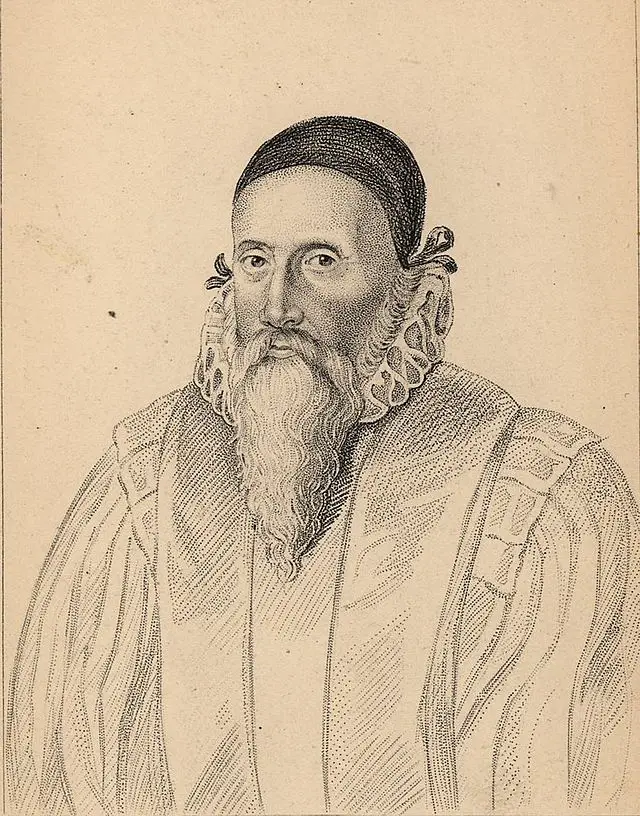The Man Who Knew Too Much (And Wanted to Know More)
John Dee wasn’t your average courtier. He was born in 1527, read Greek and Latin as a kid, and later studied at Cambridge before diving into astronomy, navigation, mathematics, and alchemy like it was a buffet. This guy didn’t just dip his toes into knowledge. He cannonballed in.
He believed the universe had a structure that could be decoded, and he wanted to understand everything. Not just the physical world, but the divine. And he wasn’t shy about it.
Queen Elizabeth I, smart as she was, knew Dee was no joke. She consulted him for everything from calendar reform to astrological predictions. Some historians believe Dee picked the coronation date for Elizabeth using the stars. The guy was basically her spiritual tech support.
And not just stars. He advised on navigation, which helped England grow into a naval powerhouse. His books were read by explorers like Sir Francis Drake. So if you’re sailing around the world and not crashing into everything, you might have Dee to thank.
The Spy Who Signed “007”
Yep. You read that right. Dee signed letters to Elizabeth with the number “007” as a code. It meant the letters were for her eyes only. Sound familiar?
He wasn’t James Bond. But he was one of the original intelligence agents, part of a network of spies protecting England from Catholic plots and foreign invasions. He traveled across Europe gathering intelligence under the guise of being a scholar. No gadgets. Just brains and charm.
Talking to Angels (Because Why Not?)
As Dee got older, his obsession shifted from science to something a little more… esoteric. He became convinced he could communicate with angels. Through a medium named Edward Kelley, Dee claimed to receive messages from celestial beings in a strange, complex language he called “Enochian.”
Was it real? Was Kelley conning him? Historians still argue. But Dee recorded thousands of pages of these conversations. He believed angels were giving him divine wisdom. He wanted to build a unified theory of everything, and he figured who better to ask than God’s messengers?
Things got weird. He ended up traveling through Europe with Kelley, chasing visions and magical secrets. It didn’t end well. His reputation soured. His library was looted. He died in relative obscurity.
Why Does He Matter?
Dee’s story is like a mirror held up to the Renaissance. He lived at a time when science and magic weren’t enemies. They were roommates. Astronomy and astrology, chemistry and alchemy, all part of the same big stew.
He reminds us that curiosity doesn’t always come in a clean, rational package. Sometimes it’s messy. Sometimes it believes in angels. But that doesn’t make it less valuable.
The Legacy He Didn’t Ask For
James Bond’s creator, Ian Fleming, knew of Dee’s legend. The 007 designation was no coincidence—it was a nod to Dee’s signature, a tribute to a man who shaped the art of spying. Today, 007 is synonymous with sleek sophistication and danger, but John Dee’s story reminds us that the real work of espionage was far more perilous.
The Shadow That Never Fades
Today, Dee is remembered as a magician, a mystic, a madman, a genius. He’s appeared in comic books, video games, conspiracy theories, and even Shakespearean lore. Some people think he was the inspiration for Prospero in The Tempest. Others think he was just really, really into weird stuff.
But if you step back, you can see what he was really chasing. Knowledge. Meaning. Connection. The same stuff we’re all chasing, just with a bit more star charts and scrying mirrors.
So next time you see “007,” maybe tip your hat to John Dee. The man who tried to map the heavens, serve his queen, and talk to angels before breakfast.
Sources:
1. British Museum: John Dee
2. Royal Museums Greenwich: John Dee
3. Woolley, Benjamin. The Queen’s Conjurer (2001)
4. The Conversation: John Dee

